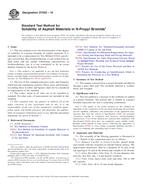Potřebujeme váš souhlas k využití jednotlivých dat, aby se vám mimo jiné mohly ukazovat informace týkající se vašich zájmů. Souhlas udělíte kliknutím na tlačítko „OK“.
ASTM D7553-10
Standard Test Method for Solubility of Asphalt Materials in N-Propyl Bromide
Automaticky přeložený název:
Standardní zkušební metoda pro Rozpustnost asfaltových materiálů v N-propylbromid
NORMA vydána dne 1.12.2010
Informace o normě:
Označení normy: ASTM D7553-10
Poznámka: NEPLATNÁ
Datum vydání normy: 1.12.2010
Kód zboží: NS-38714
Počet stran: 3
Přibližná hmotnost: 9 g (0.02 liber)
Země: Americká technická norma
Kategorie: Technické normy ASTM
Anotace textu normy ASTM D7553-10 :
Keywords:
asphalt, n-propyl bromide, solubility, Asphalts, N-propyl bromide, Solubility, ICS Number Code 91.100.50 (Binders. Sealing materials), 93.080.20 (Road construction materials)
Doplňující informace
| Significance and Use | ||||||||||||||||
|
This test method is a measure of the solubility of asphalt in n-propyl bromide. The portion that is soluble in n-propyl bromide represents the active cementing constituents. Note 2—The quality of the results produced by this standard are dependent on the competence of the personnel performing the procedure and the capability, calibration, and maintenance of the equipment used. Agencies that meet the criteria of Specification D3666 are generally considered capable of competent and objective testing/sampling/inspection/etc. Users of this standard are cautioned that compliance with Specification D3666 alone does not completely assure reliable results. Reliable results depend on many factors; following the suggestions of Specification D3666 or some similar acceptable guideline provides a means of evaluating and controlling some of these factors. |
||||||||||||||||
| 1. Scope | ||||||||||||||||
|
1.1 This test method covers the determination of the degree of solubility in n-propyl bromide of asphalt materials. It is intended to be a replacement for Test Method D2042 specifying a solvent that, like trichloroethylene, is safe in that it has no flash point, and has similar solubilizing characteristics to trichloroethylene, but it is not considered to be an ozone depleter banned by the Kyoto Protocol. Note 1—This method is not applicable to tars and their distillation residues or highly cracked petroleum products. For methods covering tars, pitches, and other highly cracked petroleum products, and the use of other solvents, see Test Methods D4, D2318, and D2764. 1.2 The text of this standard references notes and footnotes which provide explanatory material. These notes and footnotes (excluding those in tables and figures) shall not be considered as requirements of the standard. 1.3 The values stated in SI units are to be regarded as standard. No other units of measurement are included in this standard. 1.4 This standard does not purport to address all of the safety concerns, if any, associated with its use. It is the responsibility of the user of this standard to establish appropriate safety and health practices and determine the applicability of regulatory limitations prior to use. Specific precaution statements are given in Section 7. |
||||||||||||||||
| 2. Referenced Documents | ||||||||||||||||
|
Doporučujeme:
Aktualizace technických norem
Chcete mít jistotu, že používáte pouze platné technické normy?
Nabízíme Vám řešení, které Vám zajistí měsíční přehled o aktuálnosti norem, které používáte.
Chcete vědět více informací? Podívejte se na tuto stránku.




 Cookies
Cookies
